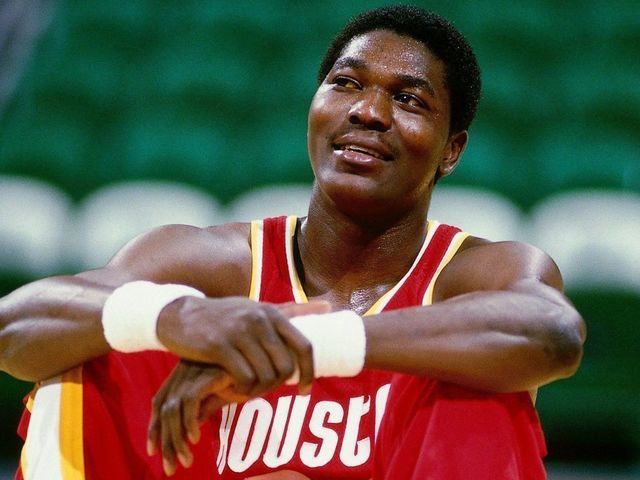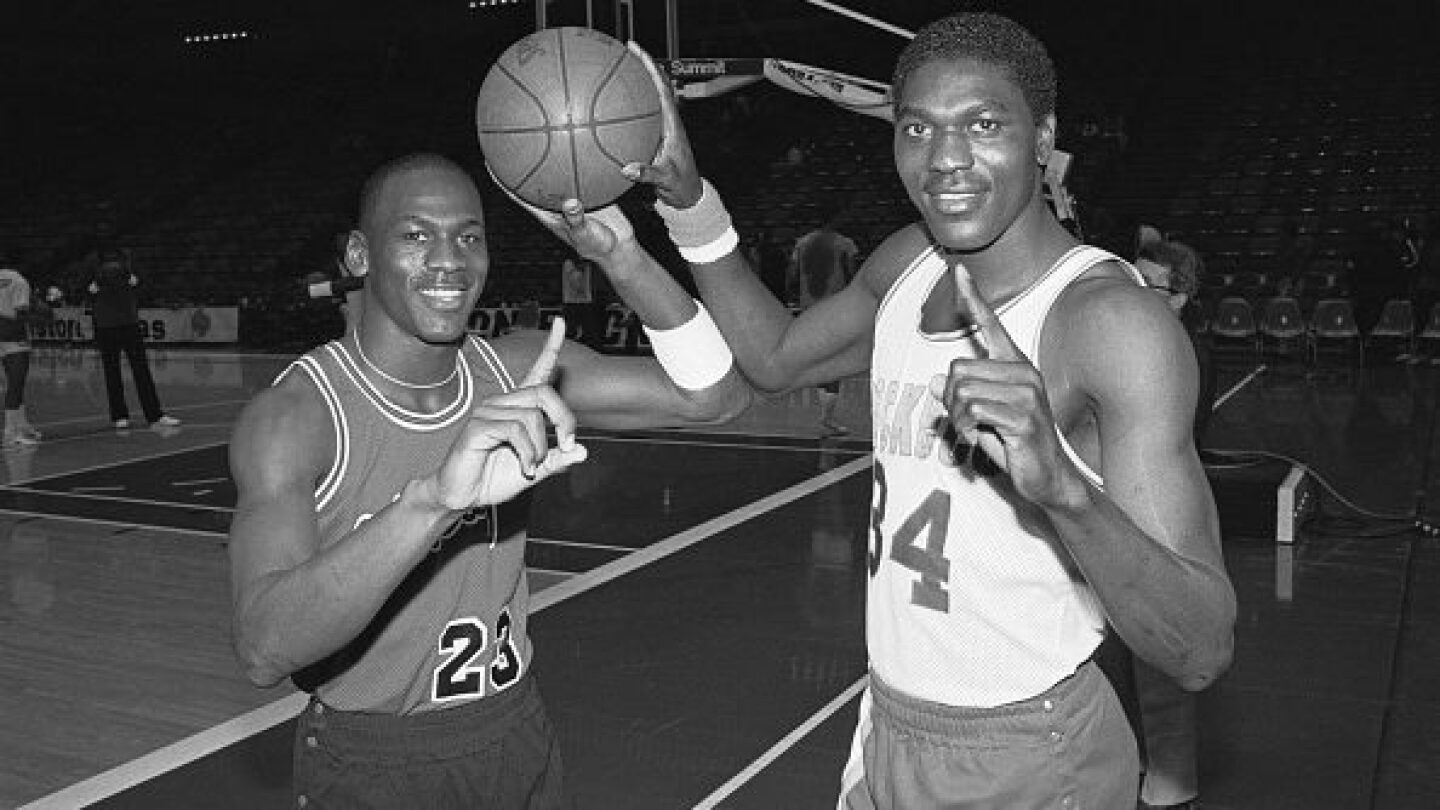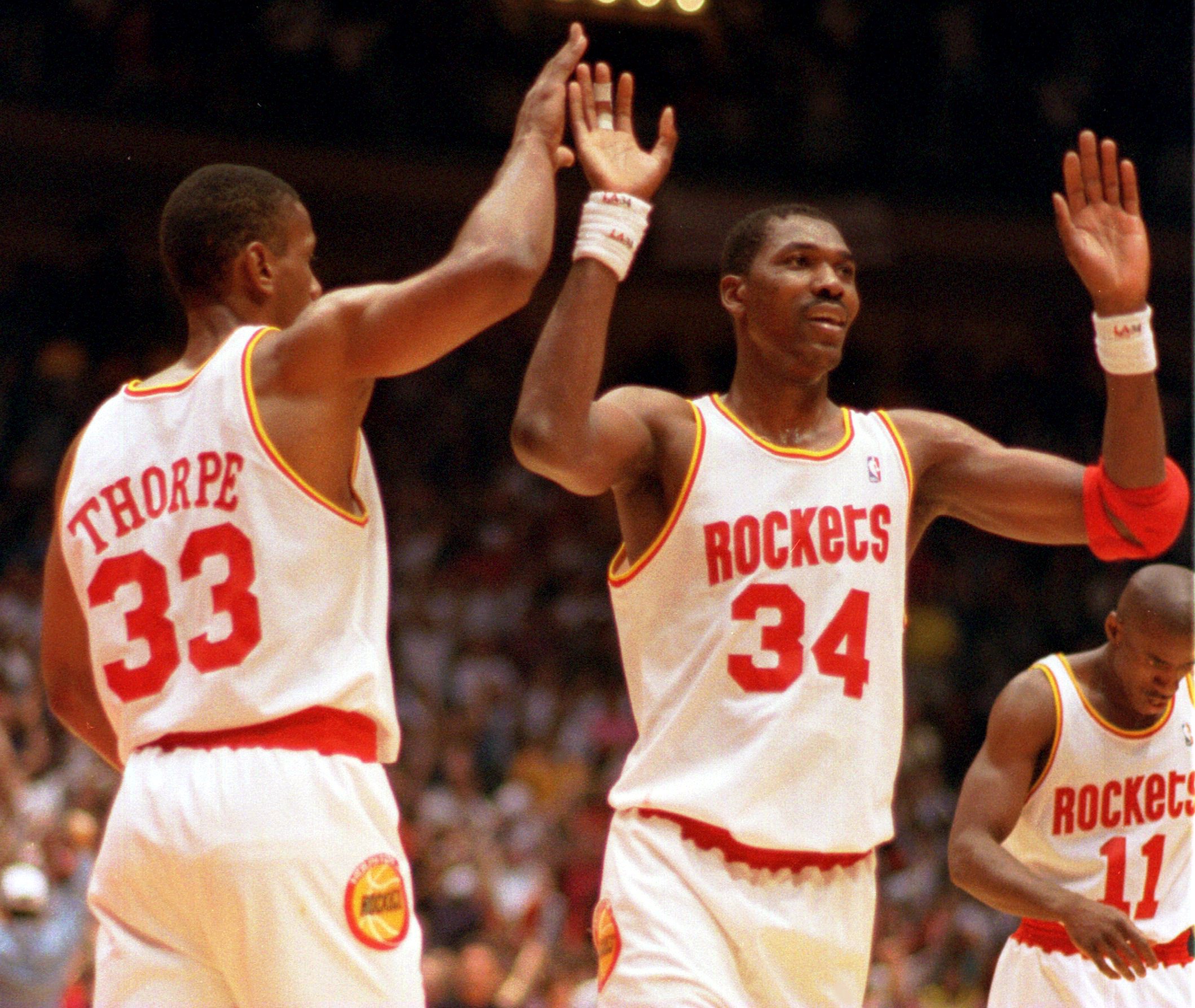Hakeem Olajuwon (Part 3)
Hakeem Olajuwon (Part 3)
/cdn.vox-cdn.com/uploads/chorus_image/image/53862255/usa_today_9865431.0.jpg)
The Houston Rockets experienced a shift in momentum following their two-year championship run, culminating in their elimination in the second round of the 1996 NBA Playoffs by the Seattle SuperSonics, who eventually became the Western Conference Champions. During this period, Michael Jordan's return to the Chicago Bulls in March 1995 led to their dominance over the league for the next three years (1996–98), preventing a potential matchup between the Bulls and the Rockets in the NBA Playoffs.
In the 1996–97 season, the Rockets added Charles Barkley to their roster and had a strong start with a record of 21–2. However, they were unable to sustain their momentum and ultimately lost in the Western Conference Finals to the Utah Jazz in six games. Despite this setback, Hakeem Olajuwon maintained solid scoring averages, contributing 23.2 points per game during the season.
The following season, Olajuwon's scoring production dipped to 16.4 points per game in 1997–98. The Rockets were eliminated in the first round of the playoffs by the Jazz in five games, leading to Clyde Drexler's retirement.
In the 1998–99 season, the Rockets acquired veteran All-Star Scottie Pippen and finished with a record of 31–19 in the lockout-shortened regular season. Olajuwon's scoring production improved to 18.9 points per game, and he earned his twelfth and final All-NBA Team selection. However, the Rockets were once again eliminated in the first round of the playoffs, this time by the Los Angeles Lakers.
Following the season, Scottie Pippen was traded to the Portland Trail Blazers, marking the end of an era for the Rockets as they navigated through roster changes and postseason challenges.
Following a period of rebuilding, the Houston Rockets brought in young guards Cuttino Mobley and Steve Francis, co-Rookie of the Year for the 2000 NBA season. However, on August 2, 2001, Hakeem Olajuwon was traded to the Toronto Raptors after refusing a $13 million deal with the Rockets. The trade involved draft picks, including one used by Houston to select Boštjan Nachbar at #15 in the 2002 NBA draft. Olajuwon signed a three-year contract worth $18 million with the Raptors.
In his debut game with the Raptors, Olajuwon scored 11 points in just 22 minutes of playing time against the Orlando Magic. However, he experienced a decline in his performance during what would be his final season in the NBA, averaging career lows of 7.1 points and 6.0 rebounds per game. A back injury ultimately led to his decision to retire in the fall of 2002.
Despite his retirement, Olajuwon left a lasting legacy in the NBA. Shortly after his retirement, the Houston Rockets retired his No. 34 jersey in honor of his contributions to the franchise. Over the course of his NBA career, Olajuwon averaged 21.8 points on 51% shooting, 11.1 rebounds, 2.5 assists, and 3.1 blocks in 1,238 career games. He also retired as the all-time league leader in total blocked shots, although shot-blocking did not become an official statistic until the 1973–74 NBA season.
In 1980, prior to his arrival in the United States, Hakeem Olajuwon played for a Nigerian junior team in the All-Africa Games. However, this presented complications when he initially attempted to play for the United States men's national basketball team. FIBA (International Basketball Federation) rules prohibit players from representing more than one country in international competition, and there is a mandatory three-year waiting period for any nationality change. Consequently, Olajuwon was ineligible for selection to the renowned "Dream Team" as he had not yet become a US citizen.
Olajuwon became a naturalized American citizen on April 2, 1993, clearing the way for him to represent the United States in international competitions. For the 1996 Olympics in Atlanta, he received a FIBA exemption and was eligible to play for Dream Team III. The team went on to win the gold medal. During the tournament, Olajuwon shared playing time with other prominent centers such as Shaquille O'Neal and David Robinson. He participated in seven out of the eight games, starting in two of them. Throughout the tournament, he averaged 5 points, 3.1 rebounds, and contributed 8 assists and 6 steals.
Hakeem Olajuwon was renowned for his exceptional skills on both ends of the basketball court. Defensively, he possessed a rare combination of agility and strength, allowing him to effectively guard a variety of opponents. His remarkable shot-blocking prowess and ability to steal the ball were standout features of his defensive game. Olajuwon holds the distinction of being the only player in NBA history to record over 200 blocks and 200 steals in the same season. Throughout his career, he averaged 3.09 blocks and 1.75 steals per game, showcasing his defensive versatility. Additionally, Olajuwon's rebounding ability was exceptional, with a career average of 11.1 rebounds per game. He led the league in rebounding twice, during the 1989 and 1990 seasons, and earned recognition as the NBA Defensive Player of the Year twice. Moreover, he was a fixture on the NBA All-Defensive First Team, earning the honor five times. In 2022, the NBA renamed its Defensive Player of the Year award in his honor, calling it The Hakeem Olajuwon Trophy.
Offensively, Olajuwon was equally impressive, known for his finesse around the basket and his agile footwork in the low post. He possessed a vast array of scoring moves, including his signature "Dream Shake," which often left defenders bewildered. Olajuwon's scoring prowess was evident, as he averaged 21.8 points per game throughout his career. He was also proficient at offensive rebounding, averaging 3.3 offensive rebounds per game. Furthermore, Olajuwon developed into a skilled dribbler with the ability to score in face-up situations like a perimeter player.
Notably, Olajuwon is one of only four players in NBA history to achieve a quadruple-double, a feat made possible since the 1973–74 season when blocked shots and steals were officially recorded as statistics. In recognition of his remarkable contributions to the game, The Athletic ranked Olajuwon as the 11th greatest player in NBA history as part of the NBA's 75th Anniversary celebrations in 2022./cdn.vox-cdn.com/uploads/chorus_image/image/71886512/1246376456.0.jpg)
References
- 1990–91 NBA season summary Archived July 4, 2011, at the Wayback Machine, basketball-reference.com, accessed November 5, 2010.
- ^ Sefko, Eddie. Rockets return Kite to Orlando – Heart problem causes center to fail physical Archived October 20, 2012, at the Wayback Machine, Houston Chronicle, July 7, 1992, accessed November 5, 2010.
- a b Sefko, Eddie. Olajuwon's salary short of fair market value Archived October 20, 2012, at the Wayback Machine, Houston Chronicle, October 11, 1992, accessed November 5, 2010.
- ^ Blinebury, Fran. Dream ends for Hakeem Archived October 20, 2012, at the Wayback Machine, Houston Chronicle, April 21, 1992, accessed November 6, 2010.
- ^ Sefko, Eddie. Olajuwon, Rockets trade shots/Club accuses star of feigning injury Archived October 20, 2012, at the Wayback Machine, Houston Chronicle, March 22, 1992, accessed November 5, 2010.
- ^ Sefko, Eddie. Agent: Olajuwon remains firm on leaving Rockets Archived October 20, 2012, at the Wayback Machine, Houston Chronicle, July 26, 1992, accessed November 5, 2010.
- ^ Blinebury, Fran. A Treetop view of Rockets' woes Archived October 20, 2012, at the Wayback Machine, Houston Chronicle, October 10, 1992, accessed November 5, 2010.
- ^ Sefko, Eddie. One more piece of bad news comes to the Rockets Archived October 20, 2012, at the Wayback Machine, Houston Chronicle, August 16, 1992, accessed November 5, 2010.
- ^ Blinebury, Fran. NBA '93/Why not the Rockets as champs? Archived October 20, 2012, at the Wayback Machine, Houston Chronicle, October 31, 1993, accessed November 5, 2010.
- ^ Sefko, Eddie. Sun's Sir Charles tips MVP crown to Hakeem Archived October 20, 2012, at the Wayback Machine, Houston Chronicle, May 29, 1993, accessed November 6, 2010.
- ^ Blinebury, Fran. Money explosion annoys Alexander Archived October 20, 2012, at the Wayback Machine, Houston Chronicle, October 28, 1993, accessed November 5, 2010.
- ^ Daily Dime: Special Edition The game's greatest giants ever Archived March 25, 2007, at the Wayback Machine, espn.com, March 6, 2007, accessed April 12, 2007.
- ^ Hakeem Olajuwon: The NBA's Best In The Mid ’90s Archived November 4, 2005, at the Wayback Machine, nba.com/rockets, accessed January 3, 2007.
- ^ Houston's Championship: Dream Come True Archived February 22, 2012, at the Wayback Machine, nba.com/history, accessed April 20, 2007.
- a b History of the NBA Finals Archived May 10, 2007, at the Wayback Machine, hollywoodsportsbook.com, accessed January 2, 2007.


















































